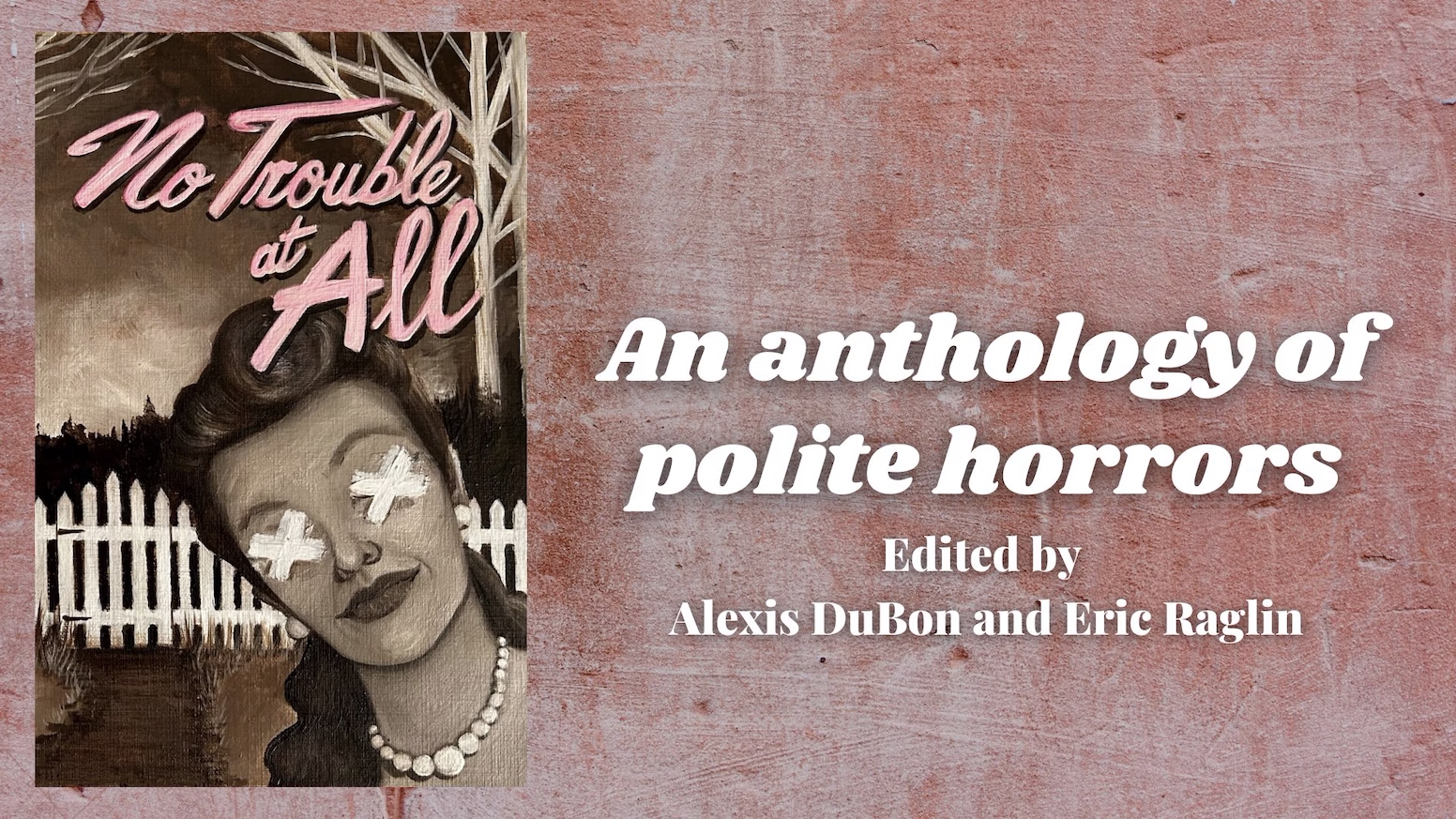[REVIEW] Cursed Morsels Press: No Trouble At All
In the southern United States, “bless your heart” translates to approximately “fuck you, you dumb bitch”. As a trans person who lived in Texas for two years, I can attest that it’s very easy for someone to wish for your demise from behind a saccharine smile, a syrupy glass of iced tea offered to you purely to give them an opportunity to spit into it. Sometimes the people who wish us harm do so with the hope that no one will bat an eye, sputtering out excuses of their wrongdoing like “well, I never saw them do anything even remotely cruel…” No Trouble At All, edited by Alexis DuBon and Eric Raglin, is the latest anthology from Cursed Morsels Press, featuring 15 stories of polite horror hidden behind white picket fences and smiling nuclear families.
Yet again, Cursed Morsels Press has pushed the boundary of what a horror anthology can be, tackling yet another unique theme. By no means do the stories in this anthology equate polite horror as slow burn. These stories absolutely drip with dread as they reveal that behind that perfect curbside view, there are great horrors within your friendly neighbor’s home. Raglin and DuBon have managed to create an anthology that challenges norms, proper manners, and our expectations of good and bad. I was impressed with the variety of stories featured in this anthology considering the lack of precedence when it comes to the book’s theme, with the group of authors offering diverse perspectives, blends of genre, and unique concepts.
“Anger Management” by J. Rohr tells the story of a ‘perfect’ nuclear family who takes out their frustrations not on each other, but rather on a ‘meat bag’ kept in their basement. This story is what I would consider the perfect exemplar of what this anthology has to offer, as our secretly cruel protagonists find their veneer of congeniality cracking as the world keeps throwing things at them that even a pound of flesh can’t fix.
Simone Le Roux’s “The Man Outside” scared me the most, following a young girl who spots a man ominously standing on her lawn but is unable to do anything as he slowly makes his way towards her home because of her mother’s insistence she be polite. It read as a slow-motion tragedy, the dread welling up in my stomach with each step the titular character made towards our protagonist over his years long trek to the front door. In a similar vein, “The Guest Room” by R.I. Meza tells the story of a bedwetting child who tries his hardest not to ruin a family reunion with his so-called “fits”, but by doing so, he finds himself unable to bring up the disturbing behavior of a strange woman who visits him at night. What I most enjoyed about these stories is how they play with dramatic irony, as the reader sees disaster looming, but our characters are unable to do anything because they don’t want to be perceived one way or another.
“Acid Skin” by Marisca Pichette provides a nice dose of body horror, as a deal is made with a demon to turn a girl’s skin acidic, giving her protection from prying hands and unwanted touches. This story impressed me at its ability to not root the character’s condition in trauma, instead framing her acid skin as a tool with which she could affirm her own asexuality and lack of interest in physical affection. In a similar vein, “When Mercy is Shown, Mercy is Given” by Angela Sylvaine follows a girl who discovers that she’s begun to grow another row of teeth and is invigorated by this despite her mother’s recent death; however, this story is tragic, detailing the ways in which societal norms can stifle an individual’s joy at their own uniqueness.
Gordon B. White’s “Thirteen Ways of Not Looking at a Blackbird” provides a more grounded case of polite horror, as a boy and his mother are abandoned by his serial killer father after one of his victims escapes. This story explores the concept of nature vs nurture as the boy begins to feel his father’s violent urges, but the true horror of this story is the way that his mother insists that there can’t be anything wrong with him. While Avra Margariti’s “Echthroxenia” blends their signature, beautiful prose with a bit of magic as a woman finds her grandmother entertaining an unwanted suitor despite her wish for independence. The twist at the end of this story recontextualizes everything you read beforehand, creating a story that I believe has a great deal of re-readability and proves Margariti’s chops when it comes to plotting.
“Welcome to the New You” by Gwendolyn Kiste perfectly finishes out this anthology, telling the story of a world where everyone has a doppelganger. You won’t know when you’ll see your doppelganger, but when you do, it’s you or them; however, this story explores the exception as a woman encounters her doppelganger and forms a societally-condemned truce. Excellent world-building, character development, and writing allows this piece to really stick its landing and finish off the anthology.
This anthology will have you wondering if the sweet old lady down the hall is cooking human flesh into her famous chili. It’ll make you look at the smiles of passerbys and walk faster. It’ll have you look at your own behavior and wonder: am I part of the problem? But I won’t be polite in saying, if you don’t find pick up this anthology, you’re missing out.
